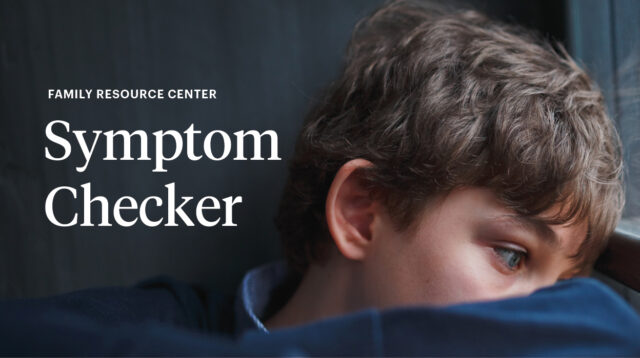Trudie Styler on ADHD and Dyslexia: Don't Give up, Do Reach Out
Katz Memorial Conversation celebrity guest talks yoga, medication, and passion
Clinical Expert: Harold S. Koplewicz, MD
When Trudie Styler—the multi-talented actor, filmmaker, eco-activist, UNICEF ambassador, mother of four, and Sting’s partner for 29 years—first started school in the British Midlands, she had trouble learning to read. School officials sent her to get her eyes tested. When it turned out the problem wasn’t with seeing the blackboard, the diagnosis was simple: She must be backwards.
“Backwards” is the British word for what we now call cognitive impairment, and it was the kind of thing kids who have dyslexia and ADHD, including Styler, got labeled with in the 1960s. While she didn’t get a real diagnosis until many years later, when she had children of her own with the same symptoms, she did have a mom who came forcefully to her defense—”a large lady given to speaking her mind,” Styler said, “who went to school and said ‘Our Trudie is not backward, she’s just slower learning to read.’”
Styler talked about her experiences growing up with ADHD and dyslexia at the ninth annual Adam Jeffrey Katz Memorial Conversation yesterday at the Kaye Playhouse at Hunter College. She was interviewed by Dr. Harold S. Koplewicz, the president of the Child Mind Institute, which sponsored the event.
School became a nightmare for Styler as she moved from a small primary school to a big high school, where she found herself lost—”just completely, physically lost in space as well as having more and more difficulties with math, and writing, and reading, which was always laborious and slow for me.”
Teachers were not sympathetic to her challenges. “Math was the biggest nightmare because I had a bully of a teacher who persistently gave me bad marks for not doing well,” she said. “And I really, really did try. Even my poor dad tried to teach himself geometry because he felt so badly that I was struggling, and I would come home and I would be really crying a lot and saying, ‘Mom, this is just too hard.’”
Dr. Koplewicz asked her what resources, or traits, helped her get through such a difficult time. Styler said she and her two sisters were brought up in the church, and sang in the choir. “I think that my faith in God began to grow, and it was that small voice when you’re extremely lonely and lost, that lets you know that you’re actually not alone, there is something bigger than you if you just have faith. And that’s what happened to me; I was quite a religious, spiritual person—still am—and put a lot of my faith in God, who in turn asked of me to put my faith in myself. And so no matter how hard it got, I knew that one day it would come right. ”
She was also a good athlete, which she said helped empower her, and it was in high school that she discovered acting. “When I got on stage and when I started to be another character, I could somehow take a distance from me, and that character would come through. So I definitely knew that there was a bigger aspect to me than this person who was suffering from a learning difficulty.”
At the end of high school she reached a crisis point—she wanted to go to school to learn acting, and her father wanted her to get a job at a local factory.
“Dad and I had an appalling fight. He said, ‘Either you go and get a job or you can pack your bags,’ ” Styler said. “I packed my bags and I left, and I decided to hitchhike to Stratford-Upon-Avon, because I thought, well, that’s how I could begin work as an actress, because that’s where Shakespeare was. It was very wild, crazy, 17-year-old thinking at the time. I’m not particularly proud of it. It was a very impulsive thing to have done, but I needed to escape that particular reality.”
Styler found haven by ringing the doorbell of a woman who had been listed as offering rooms to acting students—begging for a bed for the night, in tears—and the woman helped her look for work. She answered an ad in a local newspaper that read “Wanted: Cleaner for lively theatrical household. Bring order to chaos.”
“That lady is still in my life,” Styler said, “and she said I brought a lot of chaos, no order, but they fell in love with me, thank goodness.”
A year later she moved with the family to London, where she spent a rather unsuccessful year in teacher’s college—it’s the only school she was able to get a grant for—and finally wrote a letter to the Bristol Old Vic Acting School, laying out her situation and begging for an audition. She got one, and was accepted as a student, with a scholarship.
“My life really began there,” Styler said. “I had begun to realize my dream. It was the first time the tide wasn’t going against me. I had begun to just ride a wave.” In 1981 she joined the Royal Shakespeare Company.
When did she finally become diagnosed? Dr. Koplewicz asked.
“Sting and I have 6 kids, amongst us, and an extended family. A lot of members of our family have ADHD and dyslexia,” Styler said. “In my generation I would say 90 percent of people with ADHD and dyslexia went undiagnosed. ”
Those who have primarily the inattentive type of ADHD, rather than the hyperactive—most often girls—tend to be overlooked, she said, because they’re well-behaved. “You want to sit up straight, you want to do what the teacher asks you, you want to please people, but you’re operating in a fog a lot of the time.”
Now Styler says she gets things done with the help of a personal assistant who’s worked with her for 31 years. “Without Theresa I wouldn’t have got into this room today. ”
One of her strengths has become reaching out effectively to other people. “What my learning difference has done is taught me to be a great communicator. My mother’s advice was always, when you’re lost, always ask a policemen, and there’s a bigger truth there. To reach out. To communicate. Help is always there.”
She finds that yoga is also a big help. “Yoga has been an amazing tool for me. The physical practice has helped me maintain my body and given me strength, but the meditation aspect has been incredibly useful in stilling my mind, clearing the traffic that goes on in a chaotic mind like mine.”
Medication also helps her focus. “I’ll put my hand up to taking Adderall on days when I have scripts to read. It’s a great tool for me getting a lot done.”
To children struggling in school, she says, “As a kid you obsess on wanting to be normal. As you get older being normal is not such a big thing. Your gifts are important. Celebrate who you intrinsically are, listen for the small voice. Instead of buying into ‘I just can’t do it’ reach out and ask for help.”
Finally, Dr. Koplewicz asked Styler how she and Sting have managed to stay married so long, since living with a person with ADHD can be challenging; the divorce rate for people with ADHD is higher than the already high rate for other people. “He’s on tour a lot,” she quipped.
“It’s true, he’s more OCD than ADD,” Styler added. “He’s a very ordered person—very opposite to me, really. He reads five books a month. If I’m learning scripts I have to have them on tape.”
“I’m just a wreck in the bathroom, all my lotions and potions—poor thing, he has to deal with that. After 30 years I guess he’s just used to the wreckage. Maybe that’s why he goes on tour.”
Learn more about our Family Resource Center and our editorial mission.
Was this article helpful?
Related Reading
-
 Understanding Dyslexia: Signs of Dyslexia in Kids
Know the signs, and how to help kids with the most common learning disability
Understanding Dyslexia: Signs of Dyslexia in Kids
Know the signs, and how to help kids with the most common learning disability
-
 Complete Guide to Dyslexia
Kids learn to read at different paces, and it’s normal for them to struggle at…
Complete Guide to Dyslexia
Kids learn to read at different paces, and it’s normal for them to struggle at…
-
 Complete Guide to ADHD
Children with attention-deficit hyperactivity disorder (ADHD) find it unusually difficult to concentrate on tasks, to…
Complete Guide to ADHD
Children with attention-deficit hyperactivity disorder (ADHD) find it unusually difficult to concentrate on tasks, to…
-
 Common ADHD Myths
ADHD is often misunderstood, and outdated ideas about the disorder can keep kids from getting…
Common ADHD Myths
ADHD is often misunderstood, and outdated ideas about the disorder can keep kids from getting…
-
 ADHD Test for Kids and Teens
Our free Symptom Checker can help you determine if your child might have ADHD
ADHD Test for Kids and Teens
Our free Symptom Checker can help you determine if your child might have ADHD
-
 What Is Inattentive ADHD?
Kids don’t have to be hyperactive to have ADHD
What Is Inattentive ADHD?
Kids don’t have to be hyperactive to have ADHD
-
 Preparing for College With Dyslexia
Tools and strategies that, if they're mastered in high school, will help kids with dyslexia…
Preparing for College With Dyslexia
Tools and strategies that, if they're mastered in high school, will help kids with dyslexia…
-
 When Parent and Child Both Have ADHD
Treatment for mom or dad may be important for the kids, too
When Parent and Child Both Have ADHD
Treatment for mom or dad may be important for the kids, too








